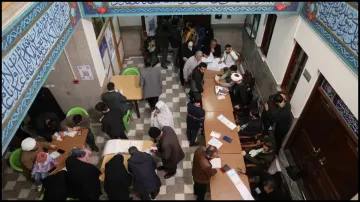Iranians vote for new parliament amid growing frustration over economic woes | WATCH
Iran's rulers are expecting a higher turnout, which seems unlikely as polls show only 41 per cent of Iranians will vote. Iran has been rattled by economic and political crises, with widespread protests over hijab rules culminating in the worst turmoil since the 1979 Islamic Revolution.

Tehran: Iranians voted for a new parliament on Friday widely seen as a test of the clerical establishment's legitimacy at a time of growing frustration over economic woes and restrictions on political and social freedoms. These are the first parliamentary elections since the mass protests over Iran's controversial hijab rules since the death of 22-year-old Mahsa Amini.
Supreme Leader Ayatollah Ali Khamenei, who has called voting a religious duty, was the first to cast his vote in Iran. "Vote as soon as possible ... today the eyes of Iran's friends and ill-wishers are on the (election) results. Make friends happy and disappoint enemies," Khamenei told state media. Despite expectations of a higher voter turnout, official polls suggest only about 41 per cent of Iranians will vote.
The new Iranian Parliament will convene later in May. Iran's rulers need a high turnout to repair their legitimacy, damaged after the unrest, after voter turnout hit a record low of 42.5 per cent in the 2020 parliament vote, while about 62 per cent of voters participated in the 2016 parliamentary election. The interior ministry said over 15,000 candidates will run for the 290-seat parliament.
Unrest in Iran during elections
Any candidate for elections in Iran must be approved by the Council, a 12-member clerical body, half of whom are directly appointed by the supreme leader. The candidates include 1,713 women, which is more than double the 819 who competed in 2020. Incumbent assembly member President Ebrahim Raisi will seek reelection to the assembly in a remote constituency in South Khorasan province, competing against a low-profile cleric.
Meanwhile, Iranian activists and opposition groups are distributing the Twitter hashtags #VOTENoVote and #ElectionCircus widely on social media, arguing that a high turnout will legitimise the Islamic Republic. "I'm seeking a regime change. I've decided not to vote as it would only serve to reinforce the Islamic Republic's hold," said university student Mehran, 22, in the central city of Isfahan. "I want to live freely."
With heavyweight moderates and conservatives staying out of the race and reformists calling it an "unfree and unfair election", the contest is between hardliners and conservatives who proclaim loyalty to Islamic revolutionary ideals. Khamenei has accused the country's "enemies" - a term he normally uses for the United States and Israel - of trying to create despair among Iranian voters.
Many analysts say that large numbers of Iranians no longer think the ruling clerics are capable of resolving an economic crisis caused by a mix of US sanctions reimposed after the failure to revive Iran's nuclear deal, mismanagement and corruption. Adding to tensions is the ongoing Israel-Hamas war in Gaza which has flared tensions in the Middle East, with Iran-backed groups Hezbollah and Houthis attacking Israeli and US targets in Lebanon and Red Sea respectively.
Khamenei has accused the country's "enemies" - a term he normally uses for the United States and Israel - of trying to create despair among Iranian voters.
Violent crackdown on anti-hijab protests
In 2022, Amini was arrested by the so-called Iranian Morality Police for not wearing the burqa (a black scarf) properly in a public place. Several videos that went viral on social media platforms showed she slipped into a coma after being tortured brutally by the Iranian police. This prompted worldwide protests against the country’s conservative Islamic theocracy.
Authorities responded with a violent crackdown in which more than 500 people were killed and over 22,000 others were detained, according to rights groups. The demonstrations largely died down in early 2023, but there are still widespread signs of discontent. For several months, women could be seen openly flaunting the headscarf rule in Tehran and other cities, prompting a renewed crackdown over the summer. Amini was awarded the EU Human Rights Prize posthumously.
According to some, a defeat of Hamas in Gaza can weaken the position of the government's supporters. During the last elections, Iran saw a voter turnout of 42.57% -- the lowest since the 1979 Islamic revolution. Additionally, supporters of reformist candidates fear another 2020 scenario after at least 28 candidates were disqualified in the initial screening.
(with inputs from agencies)
ALSO READ | Iran begins first election campaign since protests over Mahsa Amini's death in 2022